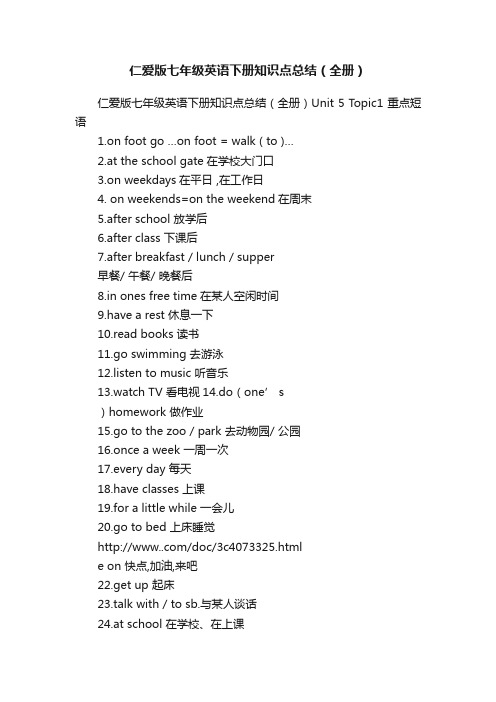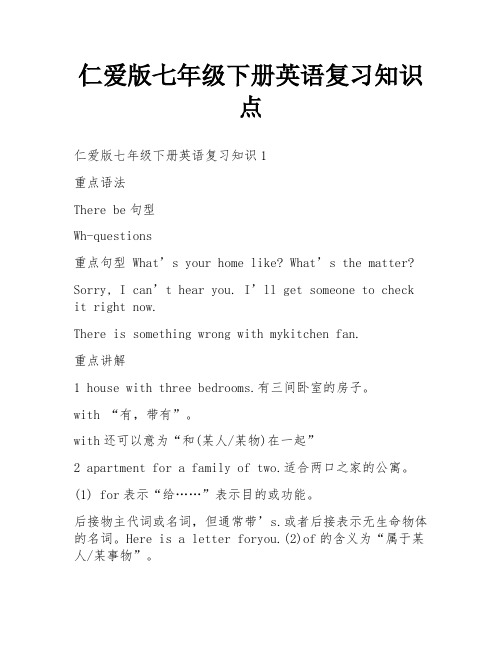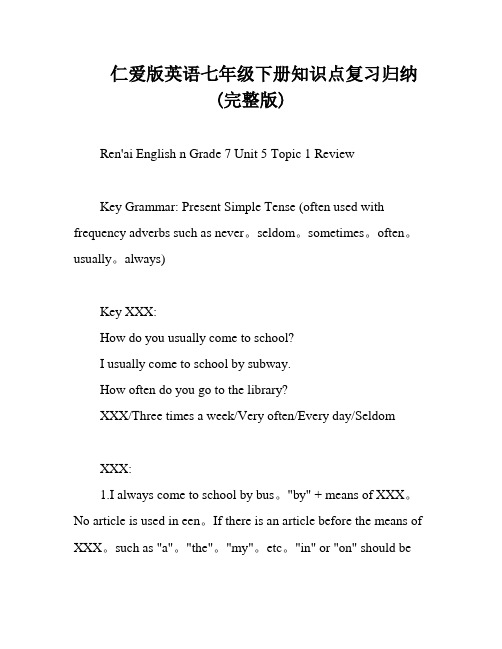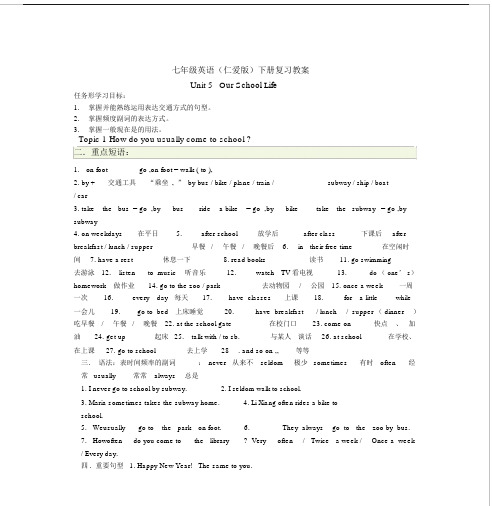2016新版仁爱英语七年级下册总复习资料
仁爱版七年级英语下册知识点总结(全册)

仁爱版七年级英语下册知识点总结(全册)仁爱版七年级英语下册知识点总结(全册)Unit 5 Topic1 重点短语1.on foot go …on foot = walk ( to )…2.at the school gate在学校大门口3.on weekdays在平日 ,在工作日4. on weekends=on the weekend在周末5.after school 放学后6.after class 下课后7.after breakfast / lunch / supper早餐/ 午餐/ 晚餐后8.in ones free time在某人空闲时间9.have a rest 休息一下10.read books 读书11.go swimming 去游泳12.listen to music 听音乐13.watch TV 看电视14.do(one’s)homework 做作业15.go to the zoo / park 去动物园/ 公园16.once a week 一周一次17.every day 每天18.have classes 上课19.for a little while 一会儿20.go to bed 上床睡觉/doc/3c4073325.htmle on 快点,加油,来吧22.get up 起床23.talk with / to sb.与某人谈话24.at school 在学校、在上课25.go to school 去上学26.and so on ……等等重点句型1.Happy New Year! The same to you.2.Your new bike looks very nice. Thank you.2.How do you usually come to school? —I usually come to school by subway.3.How often do you go to the library? —Once/Twice/Three times a week/Very often/Every day/Sedom4.The early bird catches the work. (谚语) 笨鸟先飞5.Classes begin at eight. =Class begins at eight. What time does the class begin? / What time do theclasses begin?6.We have no more time. 我们没有更多的时间了。
仁爱英语七年级下册总复习资料

仁爱英语七年级下册总复习资料七年级英语(仁爱版)下册复习教案Unit 5 Our School Life任务形学习目标:1.掌握并能熟练运用表达交通方式的句型。
2.掌握频度副词的表达方式。
3.掌握一般现在是的用法。
重点词语:1.兼类词:early walk ride watch American rest play swim2.多意词:by乘车 by train\ subway靠近,在------的旁边by the fireplace在------时间 by the time被That card was made by Lucy.用by hand由People show their love to their mothers by giving cards and other presents.(1) 词组1. wake up2. take a subway3. ride a bike4. get to school5. have a shot break6. play basketball7. play computer games8. play the piano9. listen to music 10. go roller skating 11. write letters 1.at the school gate 2. at around six o’clock 3. on weekends = on the weekend 4.on weekdays 5.in one’s spare time 6. after lunch\breakfast\supper7.after school \class 8.a little while9.ONCE\TWICE\THREE TIME A WEEK------HOW OFTEN重点句型1. How do you usually come to school?(by bus \bike\ subway\ car\ train\ ship, on foot, on my bike, on a bus, in a car---)Do you often come to school by bike?2. How often do you go to library?(always\ usually\ often\ sometimes\ seldom\ never\ ---)3. What time do you get up on weekdays?4. You must go to school early.5. Your new bike looks very nice!6. They often play basketball or football, go swimming and so on.7. Work must come first8. She likes English best.9. The early bird catches the worm.10. It’s time for sb.to do sthIt’s time for + n.要点讲解1.如何正确乘坐交通工具(主要有两种表达方法:介词表达方法和动词表达方法)by +交通工具单词,且其前不加冠词,名词也不能用复数 on + the \ a \ +交通工具单词in + the \ a \ one’s cartake the\a bus \train\subway to--- = go or come to a place by busride the\a bike to school = come to school by bikewalk to the park = go to the park on footfly to a place = go to a place by plane2.区别下列特殊疑问词How often 多久一次,是提问频率的疑问词,回答常用频率副词,常与一般现在时连用。
新版仁爱英语七年级下册总复习资料

Unit 5 Our School LifeTopic 1 I usually come to school bu subway。
重点短语1. on foot go …on foot = walk ( to )…2.by plane/ship/bus/subway3. on weekdays 在平日5. after school 放学后6. in their free time 在空闲时间7. have a rest 休息一下 8. do(one’s) homework 做作业9. once a week 一周一次10. have classes 上课11. at the school gate 在校门口 12. come on 快点、加油13. Talkwith to sb.与某人谈话 14.for a short time 一会儿15.know about 了解语法:表时间频率的副词:never 从来不 seldom 极少 sometimes 有时 often 经常usually 常常 always 总是四. 重要句型1. Happy New Year! The same to you.2. Your new bike looks very nice. Thank you.3. How do you usually come to school ? By bus / car / bike. On foot.4. It’s time for class. = It’s time to have class. 该是上课的时候了。
5. The early bird catches the worm. 笨鸟先飞。
/ 捷足先登。
6. We have no more time. 我们没有更多的时间了。
7. She goes to bed at about a quarter to ten.她九点四十五分睡觉。
仁爱版七年级下册英语复习知识点

仁爱版七年级下册英语复习知识点仁爱版七年级下册英语复习知识1重点语法There be句型Wh-questions重点句型What’s your home like? What’s the matter?Sorry, I can’t hear you. I’ll get someone to check it right now.There is something wrong with mykitchen fan.重点讲解1 house with three bedrooms.有三间卧室的房子。
with “有,带有”。
with还可以意为“和(某人/某物)在一起”2 apartment for a family of two.适合两口之家的公寓。
(1) for表示“给……”表示目的或功能。
后接物主代词或名词,但通常带’s.或者后接表示无生命物体的名词。
Here is a letter foryou.(2)of的含义为“属于某人/某事物”。
She is a friend of Lily’s. = She is Lily’s friend.3 What’s the matter?怎么了?该句常用来询问某或某物出了什么什么问题或毛病;询问具体某人或某物出了什么问题时,还可以表达为:What’s the matter with sb./sth.某人或某物出了什么毛病。
What’s the matter? = What’swrong?4 Ihear you playing the piano.我听见你在弹钢琴。
hear…doing sth.“听见……在做某事”,强调正在进行的动作。
hear…dosth.“听见……做了某事”,强调全过程。
hearabout sth.听到关于某事物的消息 hear from sb.接到某人的来信、电话等hear of sb./sth.听到或知道某人或某事物的情况5 a lot of = lots of许多后接可数名词,相当于many;后接不可数名词,相当于much,用于肯定句中;但是注意:如果是否定句,则常用many或much.6 be far from… 离……远(抽象距离)be…away from…离……远(具体距离)My school is not far from thebookstore. The sea is 2 miles away fromthe hotel.7 There is something wrong with sb./sth.某人或某物出问题/有毛病了。
仁爱七年级下册复习资料

仁爱英语七年级下册重点词组归纳Unit 5 Topic1 How do you go to school?一、重点词语:1. wake up 醒来get up起床go to bed上床睡觉I woke up at 7:00 yesterday morning.2. go to school 去上学come to school来学校go home 回家He goes home at night.3. go dancing / shopping / skating / swimming 去跳舞;购物、滑冰;游泳go doing something 可用于表达去进行某种娱乐休闲活动。
Let’s go da ncing.4. 表示交通方式:on foot 步行How do you usually go to school?I usually go to school on foot.by boat坐船by ship 坐船by air/plane 乘飞机I visited Beijing by air.by plane 乘飞机by train 坐火车by subway 搭乘地铁by car 坐小汽车by bus 坐公共汽车by bike 骑自行车5. take the subway / bus / car / taxi … 搭乘地铁;公共汽车;小汽车; 出租车6. drive a car to work = go to work by car 驾车去上班take a bus to work = go to work by bus乘公共汽车去上班go to school on foot = walk to school 步行去上学I take a bus to work.7. ride a bike / horse 骑自行车;骑马He rode a horse to go to Taishan.8. have a short rest 稍作休息一下You are tired. You should have a short rest.9. after school / class 放学以后;下课以后After class, students can play with each other.10. play the piano / guitar / violin弹钢琴;吉他;小提琴Tony likes playing the piano.play basketball / soccer / football打篮球;踢足球;打橄榄球They like playing soccer.play computer games玩电脑游戏play with a computer玩电脑play sports做运动11. how often多久一次(问频率)once一次,twice两次, three times 三次four times 四次---How often do you go to the library? ---Once a week.12. listen to music听音乐He likes listening to music.13. on weekdays在工作日at weekends在周末We go to school on weekdays.14. have breakfast / lunch / supper / dinner / meals 吃早餐;中餐;晚餐;正餐;一日三餐have classes / lessons / a meeting 上课;上课;开会We had breakfast in the morning.15. watch TV / movies / games / the animals 看电视;电影;比赛;动物read novels / newspapers / books 看小说;报纸;书Tom likes watching TV and reading books.16. wash one’s face / clothes 洗脸;衣服I wash my face every day.17. be late for 迟到I am late for school.18. the first / second / third / fourth day 第一;二;三;四天19. 表示建筑物(尤其学校建筑物):on the playground在操场at school / home / table 在学校;家里;桌旁in a computer room / teachers’ office / classroom building / gym / library在电脑室;教师办公室;教学楼;体操馆;图书馆20. 频率副词:never从不, seldom很少, sometimes有时候, often经常, usually通常, always总是二、重点句型:1. It’s time to do sth. = It’s time for doing sth.该做……了。
综合汇总:七年级下册英语复习资料仁爱版供参考.doc

七年级下册英语复习资料仁爱版一一本文精选内容均为WORD文档,下载后可直接编辑使用一一资料内容如下:七年级下册英语复习资料仁爱版Unit 1 Where's your pen pal from?%1.短语:1.be from = come from 来自于----2. live in 居住在---3. on weekends在周末4.write to sb = write a letter to sb 给某人写信;写信给某人5.in the world 在世界上6.in China 在中国7.pen pal 笔友8.14 years old 14 岁9.favorite subject 最喜欢的科目lO.theUnited States 美国the United Kingdom 英国New York 纽11.speak English 讲英语like and dislike 爱憎9.go to the movies 去看电影play sports 做运动%1.重点句式:1Where's your pen pal from? = Where does your pen pal from/2Where does he live? 3 What language(s) does he speak? 4 I want a pen pal in China.5 I can speak English and a little French.6 Please write and tell me about yourself.7 Can you write to me soon? 8 I like going to the movies with my friends and playing sports.%1.本单元的国家,人民、语言对应。
1 Canada---- Canadian---- English / French2 France -------------------------- French ----- F rench3Japan ------ Japanese----Japanese 4 Australia----Australian ------------- English5 the United States ------------- American---- English6 the United Kingdom---British ----- EnghishUnit 2 Where's the post office?—.Asking ways:(问路)1.Where is (the nearest). ?(最近的)......在哪里?2.Can you tell me the way to ....... ?你能告诉我去......的路吗?3.How can I get to ......? 我怎样到达... 呢?4.Is there .....near here / in the neighborhood? 附近有..... 吗?5.Which is the way to ...... ? 哪条是去......的路?%1.Showing the ways:(指路)1.Go straight down / along this street. 沿着这条佳亍一直走。
仁爱版英语七年级下册知识点复习归纳

仁爱版英语七年级下册知识点复习归纳仁爱版英语七年级下册知识点复归纳(完整版)仁爱版英语七年级下册知识点归纳英语七年级下册知识点归纳Unit 5 Topic1重点语法一般现在时(常与频度副词never, seldom, sometimes, often,usually, always等连用)重点句型—How do you usually come to school?—I usually come to school by subway.—How often do you go to the library?—Once/Twice/Three times a week/Very often/Every day/Seldom重点详解1I always come to school by bus.XXX签字称,表示使用某种交通体式格局,中央不加限制词,如果交通工具前有a, the, my等限制词,就不能用by,而是用in或是on.on the train=by train on his bike=by bike in my car=by car.巧辩异同on foot与wal k on foot“走路”,是介词短语,不能作谓语,只作方式状语,位于句末。
walk“走路”,是动词,可以作谓语。
goto…onfoot= walk toI often go to school on foot. =I often walk to school.仁爱版英语七年级下册常识点温归纳(完全版)同样,XXXgoto….by car = drive a car togo to…by plane = fly togoto…by bus = take a bus to2 Come on!It’stime for class. come on“快点,加油,来吧”。
It’XXX.“该做某事了”,与It’stime to do sth.意思一样。
仁爱版英语七年级下册知识点复习归纳

千里之行,始于足下。
仁爱版英语七年级下册知识点复习归纳
仁爱版英语七年级下册的知识点复习归纳如下:
Unit 1-5: 发音、单词、词组、语法(一般现在时、一般过去时、现在进行时、一般将来时)、日常用语、听力训练
Unit 6: 日常用语、单词、词组、语法(一般现在时、一般过去时、现在进行时)、听力训练
Unit 7-8: 日常用语、单词、词组、语法(一般现在时、一般过去时、现在进行时、一般将来时)、听力训练
Unit 9: 日常用语、单词、词组、语法(一般现在时、一般过去时、现在进行时、一般将来时、情态动词)、听力训练
Unit 10-11: 日常用语、单词、词组、语法(一般现在时、一般过去时、现在进行时、情态动词、动词不定式)、听力训练
Unit 12: 日常用语、单词、词组、语法(一般现在时、一般过去时、现在进行时、情态动词、被动语态)、听力训练
Unit 13-14: 日常用语、单词、词组、语法(一般现在时、一般过去时、现在进行时、完成时、情态动词、宾语从句)、听力训练
Unit 15: 日常用语、单词、词组、语法(一般现在时、一般过去时、现在进行时、完成时、情态动词、宾语从句、名词性从句)、听力训练
第1页/共2页
锲而不舍,金石可镂。
以上是仁爱版英语七年级下册的知识点复习归纳,主要包括发音、单词、词组、语法、日常用语和听力训练。
复习这些知识点能够帮助学生巩固和提高英语水平。
仁爱版英语七年级下册知识点复习归纳(完整版)

仁爱版英语七年级下册知识点复习归纳(完整版)Ren'ai English n Grade 7 Unit 5 Topic 1 ReviewKey Grammar: Present Simple Tense (often used with frequency adverbs such as never。
seldom。
sometimes。
often。
usually。
always)Key XXX:How do you usually come to school?I usually come to school by subway.How often do you go to the library?XXX/Three times a week/Very often/Every day/SeldomXXX:1.I always come to school by bus。
"by" + means of XXX。
No article is used in een。
If there is an article before the means of XXX。
such as "a"。
"the"。
"my"。
etc。
"in" or "on" should beused instead。
For example。
"on the train" = "by train"。
"on his bike" = "by bike"。
"in my car" = "by car"。
Distinguishing "on foot" and "walk": "on foot" means "walking" and is a nal phrase that cannot be used as a predicate。
七年级仁爱英语下册复习总课件

动词时态
名称
特征词
肯定句的动词
1般现在 sometimes, usually, often always, every...,
现在进行 look, listen, now,
It’s ... 几点了 . 后的句子
原形 第3人称单数
be + doing
Don’t do sth. 后的句子 1般过去 yesterday..., just now,
...ago, this morning,
过去式
When I was young,
否定句、1般疑问句的结构
句中有be,could,can,may,must, would 的变法
否定句
1般疑问句
be动词的1般过去时
1.be动词的1般过去时,表示过去存在的状态 My brother was at school yesterday. 2. be动词的过去式为was/were,其否定式为 was not/wasn’t和were not/weren’t.
3. 1般疑问句以及简略回答:—Were you born in July,1999 —Yes, I was./No,I wasn’t.
can和could的使用
1 can could “可以, 同意,准许”表示请求,允 许 could语气较can委婉
2 can“会,能”,表示能 力,could表示过去的能力
1般过去式
1、1般过去式表示: 1 过去存在的状态 2 过 去某个时间发生的动作 3 过去经常或反复 发生的动作 常用的时间状语:two days/months/years ago, last year, in those days, just now, in 2002等
2016新版仁爱英语七年级下册总复习资料(经典)

七年级下英语期末复习资料Unit 5 Our School LifeTopic 1 I usually come to school by subway。
重点短语1. on foot = walk ( to )…2.by直接接工具( by+ plane/ship/bus/subway)(介词方式,放句末起修饰作用)=take + a + 工具(plane/ship/bus/subway )(动词方式,放句中做谓语)3. on weekdays 在平日(5日) on weekends在周末(2日)4.It’s time for sth=It’s time to do sth是时候做某事5. after school 放学后6. in their free time 在空闲时间7. have a rest 休息一下 8. do(one’s) homework 做作业9. once a week 一周一次10. have classes = have a class上课11. at the school gate 在校门口 12. come on 快点、加油13. Talk with /to sb.与某人谈话 14.for a short time 一会儿15.know about 了解语法:表时间频率的副词:never 从来不 seldom 极少 sometimes 有时 often 经常 usually 常常 always 总是四. 重要句型1. How do you usually come to school ? By bus / car / bike. On foot.2. It’s time for class. = It’s time to have class. 该是上课的时候了。
3.How often do you come to the library? Three times a week./Very often./Topic 2 A few students are running on the playground.重点短语:1.make cards 制作卡片2. on the playground 在操场上3. in the library 在图书馆4. in the gym在体育馆5. on the shelf在书架上(shelves 复数)6.at the Lost and Found 在失物招领处7.do some cleaning 打扫8.swimming pool 游泳池9. on time 准时/in time及时 10.Look for 寻找11.put on 穿、戴上 12.show sb. around…令某人参观……13.a few 一些 (接复数名词,加a 表肯定,去a表否定)14.at the back of 在……后面15.borrow ...from... 从……借进某物…/lend ....to....借出去...给...四. 重要句型1.Excuse me, may I borrow some English workbooks? Of course. = Sure.2. How Long can I keep them ? Two weeks.3.You must return them on time. ( return 归还,return sth to …把……归还给……)4.what are you doing? I’m looking for my wallet.Topic 3 My school life is very interesting.重点短语:1.outdoor activities 户外活动2. easy and interesting 容易又有趣3.difficult and boring 又难又乏味4.be kind to sb. 对某人友好5.between…and…在……之间…6.learn…from…从…中学……7. from…to…从……到…… 8.tell sb. about sth告诉某人关于某事9.think of 认为 10.a little 有点儿11.have a class meeting 举行一次班会 12.draw pictures 画画重要句型1.What day is it today? Wednesday.2.What class are they having ? They are having a music class.3.What time does the next class begin ? At ten o’clock.4.What do you think of it? / How do you like it? It’s difficult and boring.5.Why do you like English ? Because it’s easy and interesting.6.What subject (学科)do you like best ? I like history best.Unit 6 Our Local AreaTopic1 Is there a computer in your study?重点词组1.Go upstairs上楼2.You have a nice study。
仁爱英语七年级下册总复习资料.doc

七年级英语(仁爱版)下册复习教案Unit 5Our School Life任务形学习目标:1.掌握并能熟练运用表达交通方式的句型。
2.掌握频度副词的表达方式。
3.掌握一般现在是的用法。
Topic 1 How do you usually come to school ?二.重点短语:1. on foot go ,on foot = walk ( to ),2. by +交通工具“乘坐,” by bus / bike / plane / train /subway / ship / boat/ car3. take the bus = go ,by bus ride a bike = go ,by bike take the subway = go ,by subway4. on weekdays在平日5.after school放学后after class下课后after breakfast / lunch / supper早餐/午餐/晚餐后6. in their free time在空闲时间7. have a rest休息一下8. read books读书11. go swimming去游泳12. listen to music听音乐12.watch TV 看电视13.do ( one’ s)homework 做作业14. go to the zoo / park去动物园/公园15. once a week一周一次16.every day每天17.have classes上课18.for a little while 一会儿19.go to bed上床睡觉20.have breakfast/ lunch / supper ( dinner)吃早餐/午餐/晚餐22. at the school gate在校门口23. come on快点、加油24. get up起床25. talk with / to sb.与某人谈话26. at school在学校、在上课27. go to school去上学28 . and so on ,,等等三.语法:表时间频率的副词:never从来不seldom极少sometimes有时often经常usually常常always总是1. I never go to school by subway.2. I seldom walk to school.3. Maria sometimes takes the subway home.4. Li Xiang often rides a bike toschool.5. Weusually go to the park on foot.6.They always go to the zoo by bus.7. Howoften do you come to the library? Very often / Twice a week / Once a week / Every day.四. 重要句型 1. Happy New Year! The same to you.2. Your new bike looks very nice. Thank you.3. How do you usually come to school ? By bus / car / bike. On foot.4. It ’s time for class. = It ’ s time to have class. 该是上课的时候了。
英语仁爱版七年级下学期总复习ppt课件

认识到了贫困户贫困的根本原因,才 能开始 对症下 药,然 后药到 病除。 近年来 国家对 扶贫工 作高度 重视, 已经展 开了“ 精准扶 贫”项 目
英语(仁爱版) 七年级(下)学期总复习
8、现在进行时中动词现在分词的构成及发音规则: 一般在动词末尾加ing. 以不发音字母e结尾的动词,先去e再加ing. 以重读闭音节结尾的动词,如果结尾只有一个辅音字母,应先双写该字母
7、一般现在时的用法 1)表现在的状态。如:I am in class 3,grade 1.我在一年级三班。 2)表经常性、习惯性的动作或存在的状态,长与表示频率的副词连用。如:
I usually go to school on foot.(=I usually walk to school.) 3)表主语具备的性格和能力等。如:She likes baseball games.她喜欢棒
get up at six. 主语(He/She/It)+doesn't+V.原形+其它。如:He/She/It doesn't get up
at six. 5、一般疑问句及其回答: Do+I/You/We/They+V.原形+其它? --Yes,I/We/They do.No,I/We/They don't. Does+he/she/it+v.原形+其它? --Yes,he/she/it does.No,he/she/it doesn't.
仁爱版英语七年级下册知识点复习归纳(完整版)

仁爱版英语七年级下册知识点归纳英语七年级下册知识点归纳Unit 5 Topic1重点语法一般现在时(常与频度副词never, seldom, sometimes, often ,usually, always等连用)重点句型—How do you usually come to school?—I usually come to school by subway.—How often do you go to the library?—Once/Twice/Three times a week/Very often/Every day/Seldom重点详解1I always come to school by bus.by+交通工具名称,表示使用某种交通方式,中间不加限定词,如果交通工具前有a, the, my 等限定词,就不能用by,而是用in或是on.on the train=by train on his bike=by bike in my car=by car.巧辩异同on foot 与walk on foot “走路”,是介词短语,不能作谓语,只作方式状语,位于句末。
walk “走路”,是动词,可以作谓语。
go to…on foot= walk toI often go to school on foot. =I often walk to school.同样,go to….by bike = ride a bike togo to…. by car = drive a car togo to … by plane = fly togo to… by bus = take a bus to2 Come on! It’s time for class. come on “快点,加油,来吧”。
It’s time for sth. “该做某事了”,与 It’s time to do sth.意思一样。
- 1、下载文档前请自行甄别文档内容的完整性,平台不提供额外的编辑、内容补充、找答案等附加服务。
- 2、"仅部分预览"的文档,不可在线预览部分如存在完整性等问题,可反馈申请退款(可完整预览的文档不适用该条件!)。
- 3、如文档侵犯您的权益,请联系客服反馈,我们会尽快为您处理(人工客服工作时间:9:00-18:30)。
七年级下英语期末复习资料Unit 5 Our School LifeTopic 1 I usually come to school by subway。
重点短语1. on foot = walk ( to )…2.by直接接工具( by+ plane/ship/bus/subway)(介词方式,放句末起修饰作用)=take + a + 工具(plane/ship/bus/subway )(动词方式,放句中做谓语)3. on weekdays 在平日(5日) on weekends在周末(2日)4.It’s time for sth=It’s time to do sth是时候做某事5. after school 放学后6. in their free time 在空闲时间7. have a rest 休息一下 8. do(one’s) homework 做作业9. once a week 一周一次10. have classes = have a class上课11. at the school gate 在校门口 12. come on 快点、加油13. Talk with /to sb.与某人谈话 14.for a short time 一会儿15.know about 了解语法:表时间频率的副词:never 从来不 seldom 极少 sometimes 有时 often 经常 usually 常常 always 总是四. 重要句型1. How do you usually come to school ? By bus / car / bike. On foot.2. It’s time for class. = It’s time to have class. 该是上课的时候了。
3.How often do you come to the library? Three times a week./Very often./Topic 2 A few students are running on the playground.重点短语:1.make cards 制作卡片2. on the playground 在操场上3. in the library 在图书馆4. in the gym在体育馆5. on the shelf在书架上(shelves 复数)6.at the Lost and Found 在失物招领处7.do some cleaning 打扫8.swimming pool 游泳池9. on time 准时/in time及时 10.Look for 寻找11.put on 穿、戴上 12.show sb. around…令某人参观……13.a few 一些 (接复数名词,加a 表肯定,去a表否定)14.at the back of 在……后面15.borrow ...from... 从……借进某物…/lend ....to....借出去...给...四. 重要句型1.Excuse me, may I borrow some English workbooks? Of course. = Sure.2. How Long can I keep them ? Two weeks.3.You must return them on time. ( return 归还,return sth to …把……归还给……)4.what are you doing? I’m looking for my wallet.Topic 3 My school life is very interesting.重点短语:1.outdoor activities 户外活动2. easy and interesting 容易又有趣3.difficult and boring 又难又乏味4.be kind to sb. 对某人友好5.between…and…在……之间…6.learn…from…从…中学……7. from…to…从……到…… 8.tell sb. about sth告诉某人关于某事9.think of 认为 10.a little 有点儿11.have a class meeting 举行一次班会 12.draw pictures 画画重要句型1.What day is it today? Wednesday.2.What class are they having ? They are having a music class.3.What time does the next class begin ? At ten o’clock.4.What do you think of it? / How do you like it? It’s difficult and boring.5.Why do you like English ? Because it’s easy and interesting.6.What subject (学科)do you like best ? I like history best.Unit 6 Our Local AreaTopic1 Is there a computer in your study?重点词组1.Go upstairs上楼2.You have a nice study。
(study名词:书房动词:学习)3.In the front of 在(内部的)前面In front of e在(外部的)前面4.talk about谈论 talk with sb.和某人谈论5.put……away 把……收拾好6.look after 照顾,看管 and so on 等等7.in the tree(非树本身,冒牌的)在树上 On the tree(树本身的东西,名副其实的)8.On the wall在墙上(表面) in the wall 在墙里(镶嵌在内部)9.tell sb about sth tell sb to do sth tell sb sth10.want sb to do sth/would like to do sth11.On the first/second /third floor 13. have a look看一看14. next to 在……近旁 15.in the center of 在……中心16. play with 一起玩耍 e in 进入,进来17. Living room 客厅,起居室 18.so many 如此多语法知识:There be 句型,译为“有”,be 动词的选择采用就近原则Topic 2 My home is in an apartment building重点短语:1.on the corner of 拐角处2.for rent 出租(rent sth to sb把某物租给某人 rent sth from sb 从某人处租某物。
)3.post office 邮局4.parking lot 停车场5.at the end of 在。
的尽头6.such as 例如7.be close to 靠近 8.be far from 远离 9.call sb. at +号码重点句型:1.What kind of home do you live in? It’s a townhouse with tow floors.2.How many floors are there in your building? There are seven.Topic 3 Which is the way to the hospital?重点短语:1.a ticket for speeding 超速罚单2.go along/up/down 沿着走 /向上/下走3.turn left/right向左转/向右转4.across from 在……对面5.change to the No.1 bus换乘1路车6.no parking禁止停车7.get hurt受伤 8.obey the traffic rules 遵守交通规则9.lose one’s life(lives)失去某人的生命10.traffic lights 交通灯 11.make a wrong turn 转向错误12.public phone 公用电话 13.on the street 在街上重点句型:①Excuse me,how can I get to the library?=Which is the way to the hospital?②It’s about 15 kilometers away from here. You can’t miss it.Unit 7 The Birthday PartyTopic1 When is you birthday ?重点词组:1.Plan to do sth2.have a birthday party3.buy sb sth=buy sth for sb4.be(was/were)born出生5.what shape 什么形状6.How long/wide/high/heavy多长、宽、高、重重点句型1.When were you born? I was born in June,19703.Where was she born? She was born in Wales,the UK.4.When was she born? She was born on october 22th,1996.5.What’s the date today? It’s May 8th.6.What shape is it?/What’s the shape of...? It’s round.Topic2 I can dance and play the guitar.重点词组:1. at the birthday party 在生日聚会上2.perform ballet 跳芭蕾舞3.dance to disco 跳迪斯科4.take … to 把…带去某地…5.work out math problems 解出数学题6.read books 读书7.fly a klite放风筝 8.be good at(doing sth)擅长做(所有介词后接动词的ing形式)…9.have a good time /enjoy oneself玩得开心 /have fun10.at the age of 在……岁时11.with one’s help / with the help of sb在某人的帮助下12.not…any more(不)再 13.be sure=make sure 确信确定+to do srh重点句型:1——.Do you want to sing Chinese songs or English songs?——Chinese songs.(选择疑问句以“or”为表示,回答只能二者任选其一)2.What else can you do? I can dance and play the guitar.4.Would you like to sing with me? Yes,I’d love to.5.I’m sure we’ll have a good time at the party.Topic 3 Everyone hag a good time.重点词组1.birthday party 生日聚会2.sing a song唱歌3.enjoy oneself 过得愉快4. play the piano 弹钢琴5.fall down 掉下 (fell down)6. hurt oneself 伤了自己7.make a wish许愿 8.by hand 亲手,手工的9.at once 立刻,马上=right away 10.blow out 吹灭(blew out)11. perform some magic tricks.表演魔术 12. hurt yourself伤了你自己重点句型1.What’s the matter/the trouble/wrong? = What’s up? 怎么了?2.I’m afraid it was too late. 恐怕太迟了Unit 8 The Seasons and the WeatherTopic 1 How is the weather in Winter ?重点词组1. take a walk 散步=walk2.had better (not)do sth最好(不要)做某事3.go out/outside 出去外面ter on 后来,稍后,之后e back to life复苏,复活6.be busy doing 忙于做某事e out 开花 8.make a snowman 做雪人9. plan to do 10.put on 穿,戴 (强调穿的动作,wear强调穿的状态 )11.get warm变暖和 12.learn to do sth 学习去做某事13.remember to do sth.记得去做某事重点句型1.What’s the weather like (in spring)? = How is the weather( in spring)?2.It’s a good season for+flying kites.(It’s a good season for+doing sth.介词方式)2.It’s a good time to+ climb hills. (It’s a good time to +do sth.不定式方式)5.Which season do you like best, spring, summer , fall or winter?6.What is the temperature? It is between …and…7.How are things going? Things are going very well.8.修饰雨雪的词汇多用heavily 修饰风多用strongly 的形式Topic2 The summer holidays are coming重点词组:1.keep away from 远离2.places of interest 名胜3.prepare for 为……作准备4.all(the)year round 一年到头5.go for a holiday(go on holidays)6.take photos /pictures 拍照7.a pair of sunglasses 8.take sth. with sb. 随身携带某物9.be friendly / kind /nice to sb对某人友好 10.swim alone 独自游泳11.travel around the county 周游这个国家 12.stay in the sun 待在阳光下13.want(would like ,plan,, wish , hope ,)to do重点句型:1.What’s the best time to go there? I think you can go anytime.2.What place should I visit in Yunnan? You should visit Dali and Lijiang.3.Did you visit any places of interest?4.How was you trip? It was wonderful.5.How did you travel there? By train.6.How long were you there? Only five days.Topic 3重点词组:1.greet each other互相问候2.the end of。
